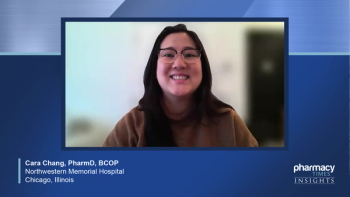Navigating EGFR-Mutated NSCLC: Clinical Insights for Pharmacists on Personalized Care

A panelist discusses how non–small cell lung cancer presents significant treatment challenges due to its prevalence, high mortality rate, poor 5-year survival outcomes, and the difficulty of managing patients with advanced disease who often have poor performance status and multiple metastases, emphasizing the importance of pharmacist involvement for proper dosing, growth factor support, and comprehensive patient education about chemotherapy.

A panelist discusses how waiting for molecular testing results before initiating treatment for non–small cell lung cancer (NSCLC) is crucial because patients with EGFR mutations can avoid chemotherapy and immunotherapy in favor of targeted oral agents like osimertinib, which offer survival benefits with minimal toxicity compared to traditional treatments, while premature immunotherapy could cause severe immune-related adverse events that might preclude later use of more appropriate targeted therapies.

A panelist discusses how recent clinical trials for EGFR-positive non–small cell lung cancer (NSCLC) have expanded treatment options beyond single oral agents, with studies like FLAURA2, MARIPOSA, and PAPILLON demonstrating significant improvements in progression-free survival for combination therapies such as osimertinib plus chemotherapy and amivantamab plus lazertinib, though these combinations often come with higher rates of toxicity, discontinuation, and adverse effects compared to monotherapies.

A panelist discusses how combining therapies for EGFR-positive non–small cell lung cancer (NSCLC) increases both benefits (improved progression-free survival, response rates, and duration of response) and adverse effects, emphasizing that treatment selection should consider patient-specific factors like central nervous system (CNS) metastases, performance status, treatment aggressiveness preferences, and real-world limitations where patients often differ from clinical trial populations in terms of organ dysfunction, concomitant medications, and previous treatments.

A panelist discusses how implementing new clinical trial findings into practice involves multiple challenges including operationalizing treatment regimens in electronic medical records (EMR), procuring medications, obtaining formal approval through institutional committees, and, most significantly, securing insurance approval since insurers often update their formularies less frequently than FDA approvals occur, which can delay patient care.

A panelist discusses how pharmacists contribute to multidisciplinary care for patients with non–small cell lung cancer (NSCLC) by providing comprehensive education, creating customized medication calendars, ensuring appropriate dose adjustments for individual patient factors, advocating for patients to balance efficacy with toxicity management, and helping patients navigate insurance systems to access expensive medications through assistance programs, particularly when transitioning from targeted therapies to more complex regimens.

A panelist discusses how emerging advancements in non–small cell lung cancer (NSCLC) treatment include the anticipated FDA approval of subcutaneous amivantamab, which would significantly reduce infusion-related reactions seen in the MARIPOSA trials while improving patient experience and reducing infusion center chair time, as well as promising antibody-drug conjugates like sacituzumab govitecan (Trodelvy) that may provide better first and second-line treatment options with potentially less toxicity than current standard regimens.

A panelist discusses how EGFR tyrosine kinase inhibitors (TKIs) commonly cause dermatologic toxicities (including acneiform rash, dry skin, photosensitivity, and paronychia) and diarrhea, which can significantly impact patients’ quality of life by causing physical discomfort, affecting appearance, and limiting daily activities.

A panelist discusses how to minimize EGFR tyrosine kinase inhibitor (TKI) adverse effects through preventive measures such as maintaining good skin regimens with moisturizers and SPF 30+ sunscreen, prescribing topical steroids and antibiotics for skin rash, and managing diarrhea with hydration, diet modifications, and loperamide.

A panelist discusses how clinical trials and institutional guidelines have improved the management of infusion-related reactions (IRRs) through standardized premedication protocols, including the SKIPPirr trial, which demonstrated that home dexamethasone use prior to amivantamab infusions can significantly reduce reaction rates from 67% to 22.5%.

A panelist discusses how evidence-based protocols for managing infusion-related reactions have reduced hesitancy among health care providers to use agents like amivantamab, empowered the entire care team with knowledge, and balanced the benefits and challenges of oral vs intravenous (IV) chemotherapy administration in relation to patient autonomy, adherence, and quality of life.

A panelist discusses how the PALOMA-3 study demonstrated that subcutaneous amivantamab is noninferior to intravenous (IV) administration with significantly lower infusion-related reaction (IRR) rates (13% vs 66%), shorter administration time (5 minutes vs 5 hours), higher patient-reported convenience (85% vs 35%), and improved clinical outcomes, making it potentially preferable for most eligible patients once FDA approved.

A panelist discusses how maintaining efficacy while preserving quality of life requires personalized approaches including dose adjustments or agent rotation based on specific toxicities, and how selecting the appropriate EGFR inhibitor depends on patient comorbidities, performance status, baseline conditions (such as interstitial lung disease or cardiac issues), and patient preferences.

A panelist discusses how emerging research in non–small cell lung cancer (NSCLC) is focused on determining the most effective neoadjuvant/adjuvant approaches combining chemotherapy with immunotherapy, addressing tumor heterogeneity through potential combinations of targeted therapies, and investigating mechanisms of immunotherapy nonresponse to improve patient outcomes.


